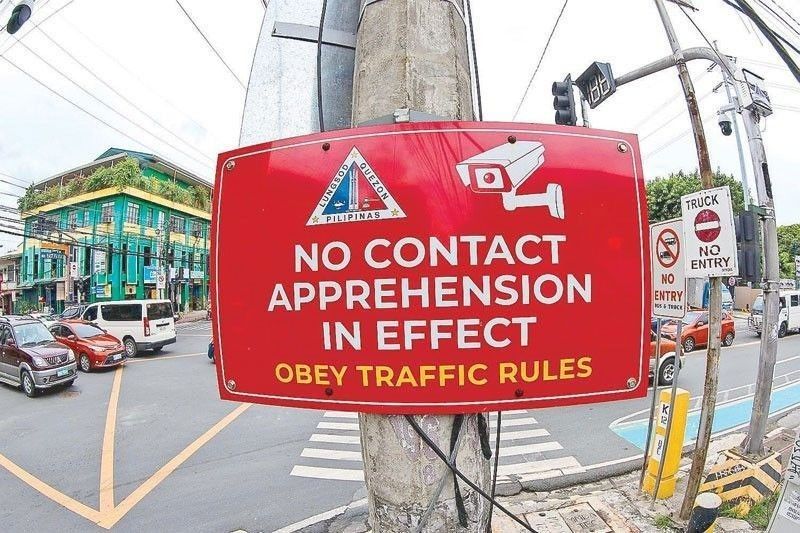How motorists, public benefitted from No Contact Apprehension Policy

For a period, motorists in several Metro Manila cities experienced the big difference the No Contact Apprehension Policy (NCAP) could make in their commuting life.
Local government units reported positive results during the time the NCAP was in place in their jurisdictions.
After all, the NCAP was really conceived of and implemented to make traffic enforcement more efficient and less vulnerable to human intervention. The underlying goal was to improve road safety and help ease traffic congestion by instilling greater discipline in drivers.
The City of Manila, for instance, reported that fatal and non-fatal injuries dropped by 917 from its 2019 numbers, according to the MMDA’s Metro Manila Reporting and Analysis System 2021 Annual Report. As of August 2022, average daily violations per camera dropped significantly from 56 in December 2020 to just three in August 2022.
In Quezon City, Mayor Joy Belmonte said in August last year that traffic violations in affected areas under the city’s NCAP program fell by 75%.
Parañaque City adopted the NCAP in 2018 using artificial intelligence and technologies in identifying traffic violators 24//7. As a result, and on a per-camera basis, traffic violations dropped by a staggering 84% according to recorded data from 2018 to 2022.
And then, in Valenzuela City, Mayor Wes Gatchalian said that since they implemented the NCAP in 2019, some 200,000 traffic violators have been apprehended.
All these initial but substantial gains were suspended, however, when the Supreme Court issued a temporary restraining order (TRO) on the NCAP as a result of two petitions filed before it, questioning the policy’s constitutionality.
The first petition was filed by transport groups who argued that motorists were under the constant threat of being arbitrarily apprehended, and that the penalties under the NCAP were unreasonable.
The second petition was filed by a lawyer who claimed the NCAP violated his right to due process. The NCAP compromised people’s right to data privacy, he claimed, since traffic violation records and personal details of motorists could easily be obtained.
The Supreme Court recently finished hearing the arguments for the said case. Now the public awaits what the decision would be on the matter.
As consumer advocates, CitizenWatch Philippines recognizes that there is indeed a need to safeguard the privacy of citizens’ information. Data privacy is sacred and must be upheld by no less than the government even – or especially – in its efforts to deliver public services and implement policies.
The LGUs themselves, who are the main implementers of the NCAP in their respective areas, have committed to protecting their citizens’ private information.
People have to go back to the principle that gave rise to the NCAP in the first place – the need for better observance of traffic regulations for the safety and convenience of motorists, commuters, and the general public alike.
The NCAP, powered by technology that drastically reduces human error and intervention, is a tool to ensure that all drivers who commit violations will be accountable for their action and suffer the consequences – whatever their status or occupation is, whatever make and model of their vehicle is, whether they are going to their posh offices or driving a humble jeepney. It is evidence-based because a camera records the violation.
The NCAP is non-discriminatory; it is an equalizer in many ways. And if a driver does not want to pay the penalties, the solution is simple: abide by traffic rules, and drive carefully and conscientiously.
The only people who would be against the NCAP are those drivers flouting traffic rules and posing harm to other people. How can they expect just a slap on the wrist for endangering others?
Another distinct benefit of the NCAP is that it removes opportunities for bribery. Apprehended drivers can no longer ask enforcers how they can “fix” the situation. They will have the chance to explain their case to their LGU’s traffic adjudication board.
No less than President Ferdinand Marcos Jr. said that digital transformation is a priority of his administration. This includes enabling the government to use digital tools to deliver services to the people. He also committed to certify the proposed E-Governance Act as urgent: the NCAP is consistent with these pronouncements.
A recent Pulse Asia survey, commissioned by think-tank group Stratbase, found that eight in 10 Filipinos approve of the NCAP’s implementation confirming the responsiveness of the policy to a daily public concern. Contrary to NCAP oppositors, the respondents concur that “NCAP will be effective in achieving its objective of disciplining motorists to improve road safety.”
With the recent conclusion of oral arguments for the lifting of the TRO, the public await the Supreme Court’s decision with optimism. The NCAP needs to be implemented as envisioned.
The public must be suspicious of the who oppose this policy. Only those with reckless regard for life, safety, and traffic regulations will question this innovative policy that uses technology for law enforcement.
Making the roads safe and easing the congested flow of traffic with basic road courtesy will have benefits beyond the convenience and safety of road user. Faster movement of traffic will even help boost the efficiency and productivity of all sectors of society. NCAP will be for the good not only of motorists and commuters, but of all citizens alike.
Atty. Teofilo “Tim” Abejo is the co-convenor of consumer advocacy group CitizenWatch Philippines, a partner CSO of think tank Stratbase ADR Institute.
- Latest





























